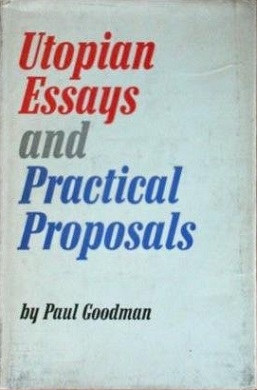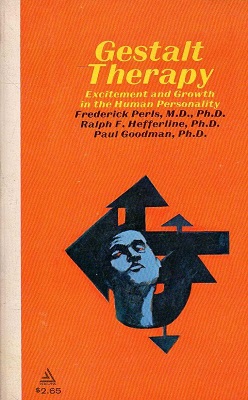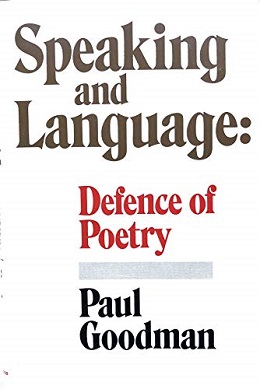 First edition | |
| Author | Paul Goodman |
|---|---|
| Published | 1959 (Bobbs-Merrill) |
| Pages | 621 |
The Empire City is a 1959 epic novel by Paul Goodman.
 First edition | |
| Author | Paul Goodman |
|---|---|
| Published | 1959 (Bobbs-Merrill) |
| Pages | 621 |
The Empire City is a 1959 epic novel by Paul Goodman.

Goodman wrote The Empire City over the course of almost 20 years. [1] He began work on his epic, The Empire City, upon returning to New York City in 1939 from his graduate work at the University of Chicago. Throughout his studies and prior to graduate school, Goodman had written poems, plays, and stories, but with a grant in hand to write his dissertation and some monthly money from his mother-in-law, Goodman once again afforded himself a few years to pursue his art before his scholarship. Having been homesick for his native town, the task of his novel was a kind of homecoming. [2] The Grand Piano, which would become the first volume of The Empire City, was published by Colt Press in 1942. [3]
The second volume, The State of Nature, was published by Vanguard Press in 1946. The press had published a book of Goodman's stories the year prior and would publish Goodman's book on Kafka in 1947, but they each sold progressively worse. [4] Withered by World War II and his self-confidence shaken, Goodman began a self-analysis in the style of Freud that culminated in a separate, self-analytic novel. [5] Goodman, who felt most comfortable as an artist, used self-reflexive fiction as a vehicle for self-analysis throughout his life. [6] After finishing the self-analytic novel, Goodman completed the next book of his epic, The Dead of Spring, but publishers (including Vanguard) were uninterested in both, even as Goodman considered The Dead of Spring his best work. Goodman self-published the third volume on David Dellinger's New Jersey pacifist commune press in 1950 after soliciting subscriptions from 200 friends via postcards. [7] He was distraught by the lack of wider interest in his work and bereft of purpose in how his writing could serve either his desire for external validation or his desire to impact change in his fellow man. [8] The Dead of Spring articulated Goodman's great personal dilemma: "If we conformed to the mad society, we became mad; but if we did not conform to the only society that there is, we became mad." [9]
This theme of questioning how to integrate one's self into society recurs throughout Goodman's fourth volume, The Holy Terror, which he wrote in 1952 and 1953. [9] By this time, Goodman was embedded in the nascent world of Gestalt therapy, having co-written its seminal text for publication in 1951. [10] Goodman's characters and their desires reflect the type of relationships the author was exploring as a new therapist. [9] Unlike the prior books, in which Horatio detached himself from the absurd society, in The Holy Terror, Horatio attempts, with mixed success, to integrate into the larger society. [11]
In a later interview, Goodman explained that he would have continued the novel, but the next action for Horatio for which he was looking became Goodman's epochal 1960 work, Growing Up Absurd.
The novel was issued in paperback by Bobbs-Merrill in 1964, at the height of Goodman's fame as a social critic, and later re-issued, posthumously, in 1977, by Vintage, the main publisher of Goodman's political and social works of the sixties; this edition contains an editorial note (concerning the editing of the end of the novel) by one of Goodman's literary executors, Taylor Stoehr, and an illuminating five-page Preface by Goodman's good friend, the critic Harold Rosenberg, who, comparing it to Melville's Mardi, writes that "however one judges 'The Empire City' as a novel, there is no doubt that it is a great book" (Rosenberg xi), noting (and quoting from the book) that "Goodman has the humor, high and low, of a never-failing contradictory intelligence, plus the exuberance of one who has been visited by the animal faith [...] that there are weapons 'that do not weigh one down' and that the lover of life has also on his side 'the force that is in the heart of matter, that, as if stubbornly, makes things exist rather be mere dreams or wishes'" (Rosenberg xi-xii). The book was again later re-issued by Black Sparrow Press, with a long introduction by Stoehr, in 2000.
Richard Kostelanetz described The Empire City as Goodman's most impressive fiction, mainly in its conception and not its execution. [12]
Academic Theodore Roszak wrote in 1967 that, among Goodman's works, The Empire City was the most likely to endure. [13] He described the book as a social-philosophical existential sociology of American society that combines elements of novel, pamphlet, treatise, and reportage as Goodman's "running commentary on the steep American ascent to Empire as seen from the vantage point of a tiny communitarian circle surviving by its wits and the public welfare in megapolitan New York". [14]
The Encyclopedia of Gay Histories and Cultures described it as a "neglected masterpiece of experimental fiction" and "a key link between surrealist and postmodern writing". [15]

Growing Up Absurd is a 1960 book by Paul Goodman on the relationship between American juvenile delinquency and societal opportunities to fulfill natural needs. Contrary to the then-popular view that juvenile delinquents should be led to respect societal norms, Goodman argued that young American men were justified in their disaffection because their society lacked the preconditions for growing up, such as consideration and self-respect, meaningful work, honorable community, sexual freedom, and spiritual sustenance.

Five Years is an autobiographical collection of Paul Goodman's notebooks between 1955 and 1960.

Communitas: Means of Livelihood and Ways of Life is a 1947 book on community and city planning by Percival and Paul Goodman. Presented as an illustrated primer on how city planning affects socioeconomic order and citizens' empowerment to better their communities, the book reviews historical and modern approaches to urban planning before proposing three of the Goodmans' own provocative community paradigms.

Utopian Essays and Practical Proposals is a 1962 book of essays on social issues by Paul Goodman.

Kafka's Prayer is a 1947 book-length analysis of the novelist Franz Kafka and his works by Paul Goodman. Using Freudian and Reichian psychoanalysis, Goodman assesses the philosophical and religious significance of Kafka's aphoristic statements and three novels. He levels an anarchist societal critique against social institutions borne from neuroticism. Goodman used the book, published by Vanguard Press, to grapple with the religious implications of psychoanalysis and transition from a career writing on Jewish concerns to a period that would culminate in his collaboration on the founding work of the gestalt therapy movement.

The May Pamphlet is a collection of six anarchist essays written and published by Paul Goodman in 1945. Goodman discusses the problems of living in a society that represses individual instinct through coercion. He suggests that individuals resist such conditions by reclaiming their natural instincts and initiative, and by "drawing the line", an ideological delineation beyond which an individual should refuse to conform or cooperate with social convention. While themes from The May Pamphlet—decentralization, peace, social psychology, youth liberation—would recur throughout his works, Goodman's later social criticism focused on practical applications rather than theoretical concerns.

Gestalt Therapy is a 1951 book that outlines an extension to psychotherapy, known as gestalt therapy, written by Fritz Perls, Ralph Hefferline, and Paul Goodman. Presented in two parts, the first introduces psychotherapeutic self-help exercises, and the second presents a theory of personality development and growth.

This is a list of works by Paul Goodman (1911–1972), including his nonfiction, novels, short stories, poetry, and plays.

Speaking and Language: Defence of Poetry is a book of criticism by Paul Goodman that blames academic, structured approaches to linguistics for diminishing the role of creativity and spontaneity in speaking and human nature.

Like a Conquered Province: The Moral Ambiguity of America is a book of Paul Goodman's Massey Lectures for the Canadian Broadcasting Corporation on topics of American pathologies, in particular, citizens not taking responsibility for the consequences of inequality and harmful technologies. He advocates for decentralized alternatives to existing institutions that give greater control to individuals.

Little Prayers and Finite Experience is a book of prose and poetry by Paul Goodman.

Collected Poems is a book of Paul Goodman's collected poetry, edited by his literary executor Taylor Stoehr and introduced by George Dennison.

Making Do is a 1963 novel written by Paul Goodman and published by Macmillan.

Paul Goodman described himself as a man of letters but foremost a poet. He published several poetry collections in his life, including The Lordly Hudson (1962), Hawkweed (1967), North Percy (1968), and Homespun of Oatmeal Gray (1970). His Collected Poems (1973) were published posthumously.
Paul Goodman's oeuvre spanned fiction, poetry, drama, social criticism, psychoanalytic theory, and literary analysis. While he viewed himself as a man of letters, he prized his stories and poems above his other work. To Goodman, writing was "his vice" or "way of being in the world".
Taylor Stoehr (1931–2013) was an American professor and author. He edited several volumes of Paul Goodman's work as his literary executor.
"The Politics of Being Queer" is a 1969 essay by Paul Goodman on the connection between his bisexuality and his personal politics. It is noteworthy for its role in reclaiming the word "queer". Originally published as "Memoirs of an Ancient Activist", Goodman revised the essay, which was retitled and published posthumously.

Parents' Day is a 1951 novel by Paul Goodman. Written as autobiographical fiction based on the author's experiences teaching at the upstate New York progressive boarding school Manumit during the 1943–1944 year, the book's narrator grapples with his homosexuality and explores a series of sexual attractions and relationships that culminates in his being fired by the school. Goodman wrote the novel as part of a Reichian self-analysis begun in 1946 to better understand his own life. He struggled to find a publisher and ultimately self-published through a friend's small press. Reviewers remarked on unease in Goodman's sexual revelations, lack of self-awareness, and lack of coherence in the text. Parents' Day sold poorly and has been largely forgotten, save for some recognition as an early gay American novel.
Prior to his career in social criticism, the American writer Paul Goodman had a prolific career in avant-garde literature, including some 18 works for the stage. His plays, mostly written in the 1940s, were typically experimental. Their professional productions were either unsuccessful or flopped, including the three productions staged with The Living Theatre in the 1950s and one with The American Place Theatre in 1966. His lack of recognition as a litterateur in the 1950s helped drive him to his successful career in social criticism in the 1960s.

Paul Goodman was an American writer and public intellectual best known for his 1960s works of social criticism. Goodman was prolific across numerous literary genres and non-fiction topics, including the arts, civil rights, decentralization, democracy, education, media, politics, psychology, technology, urban planning, and war. As a humanist and self-styled man of letters, his works often addressed a common theme of the individual citizen's duties in the larger society, and the responsibility to exercise autonomy, act creatively, and realize one's own human nature.